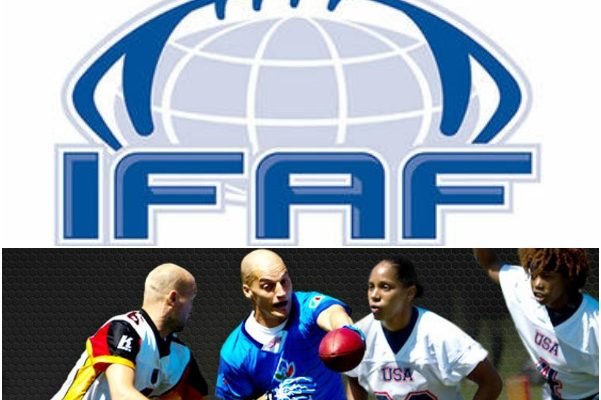IFAF Flag World Championships Moved After Dispute With Local Flag Leagues

The International Federation of American Football (IFAF) Flag World Championships, scheduled to have been played in the Bahamas next week supposedly after years of preparation, have been moved at the last minute, from the Bahamas to Miami due to a squabble between opposing local football organizations in the Bahamas.
Although not quite of the same magnitude of a disaster as the 2014 cancellation of the IFAF World Championships in Stockholm, the politics involved in moving one of the flagship events for IFAF still gave the sport a black eye.
Originally scheduled six years ago, the tournament, organized by the Bahamas American Football Federation (BAFF) a body which has been a member of IFAF for eight years, had gained the approval of the Ministry of Tourism in the Bahamas.
That support evaporated suddenly in recent weeks under intense pressure.
A visit to the Bahamas in April by representatives from IFAF, Richard McLean (Football Canada) and Mikael Roos from Sweden who handles organizing flag tournaments from IFAF and IFAF Europe, seemed to help solidify support and ensure that the event would proceed.
Squabble turned war
However, with only a month before the September 8 start of the tournament, the squabble erupted into a war with the Grand Bahama Flag Football League (GBFFL), the Bahamas Flag Football League (BFFL) and the Abaco Flag Football League (AFFL) banding together saying in a joint statement that every aspect of the event has been undertaken without their direct involvement. This also included the selection of the Bahamian National Team.
Supported by the Commonwealth American Football League, the group stated they would boycott the tournament. Given the pressure, the Bahamas Ministry of Tourism, caught in the crossfire, withdrew their support for the event and organizers were forced to move it to Miami to ensure that the tournament would take place in the same time frame. Had it been postponed at this late stage, the participating countries would have suffered serious financial losses in flights.
IFAF split spills over
Antonio Mayock, the president of the Commonwealth American Football League (CAFL) had described BAFF as a rogue group. CAFL executive Michael Foster went further in speaking with the Tribune242 of the Bahamas:
“We expect in short order to be granted the status of recognition by the true, legitimate IFAF. On the world stage we cannot imagine that we had just played a part in crushing a hostile takeover pf a rogue IFAF over the legitimate body despite whatever misfortune the legitimate president Tommy Wiking has.”
So it would seem that the split between two IFAF factions has had a part in having the tournament moved. In an email to one of the organizers, Foster stated that Tommy Wiking had been involved and that the CAFL was joining the Wiking faction and implied that his group did not recognize the IFAF faction that was organizing the tournament.
However, three countries with allegiance to the “Wiking IFAF” – Guatemala, France and Italy – are still participating in the tournament which features both a men’s and women’s competition.
“This last minute cancellation according to published reports and information relayed to me, will cost the about 17 other countries tens of thousands of dollars and will hurt the Bahamas chances to host future flag football tournaments of this magnitude.”
The event was originally awarded to the Bahamas in 2010 by IFAF (from the IFAF archives):
In 2016, another country will host its first-ever IFAF event when the 2016 IFAF World Flag Football Championship is held in the Bahamas. The Bahamas American Football Federation (BAFF) became a member of the Pan-American Federation of American Football (PAFAF) and IFAF in 2008 and has previously entered international competition at the junior national level.
“It is a tremendous honor, as a newer nation within the IFAF member federations, to be selected as the host nation,” said LaLISA ANTHONY President of BAFF. “The Bahamas is committed to the continued development and enhancement of the sport. We are looking forward to hosting this great event and participating in as many IFAF events as possible.”
The host countries for the Flag Football World Championships were decided during the IFAF Executive Meeting held on Wednesday, November 10.
“We are delighted that two of our younger federations have committed to hosting one of our showpiece tournaments,” said IFAF President TOMMY WIKING. “IFAF will continue to prosper through participation in competitions and it is important to host events in new venues throughout the world.
“Flag football is not only one of the game’s key grassroots initiatives that introduces young players to the game, but also provides an exciting challenge for top athletes participating in the non-contact version of football.”
Not first time event moved
This is not the first time the tournament has been moved. Two years ago IFAF was forced to move the same event, scheduled to be played in Israel, to Italy due to travel issues at the time to Israel.
Tournament moved to Miami
Nevertheless, the tournament is moving forward in the Miami area. The 2016 International Federation of American Football (IFAF) Men’s and Women’s Flag Football World Championships will feature a total of 15 national teams from Sept. 8-11 at Brian Piccolo Park in Hollywood, Fla.
Each world championship will culminate in Gold Medal games on Sunday, Sept. 11.
Participating Countries
Men’s: Austria, Canada, Denmark, Great Britain, Guatemala, Israel, Italy, Japan, Korea, Mexico, New Zealand, Panama, United States
Women’s: Austria, Brazil, Canada, Denmark, Guatemala, France, Israel, Japan, Mexico, Panama, United States